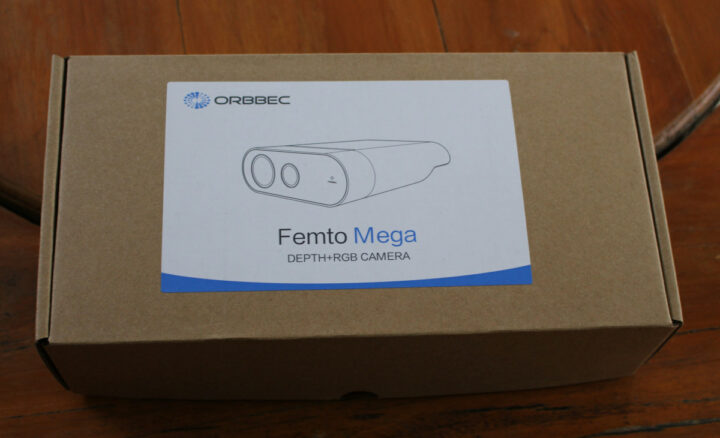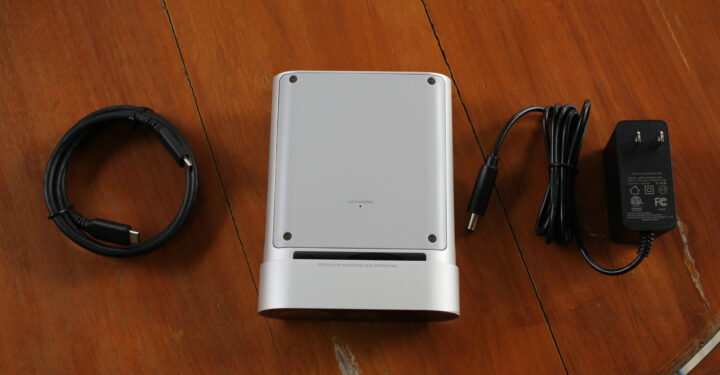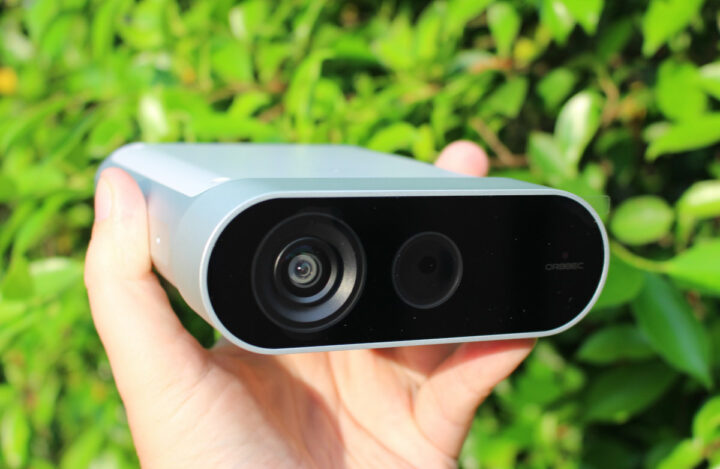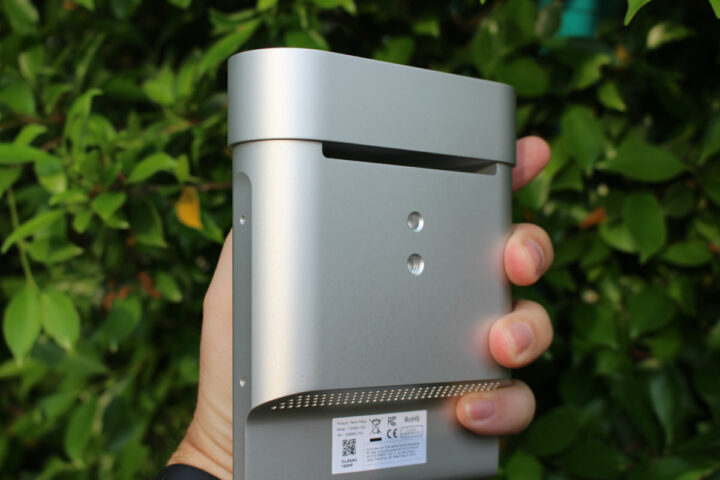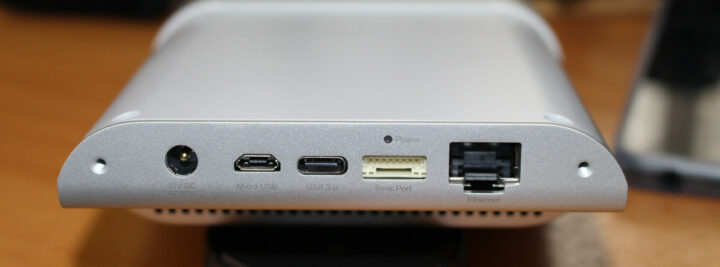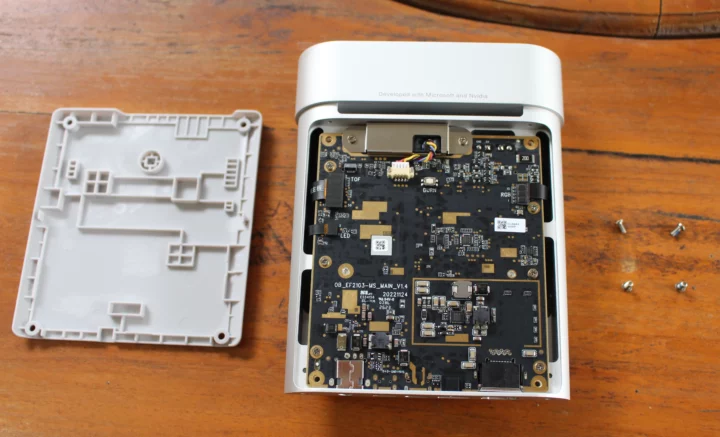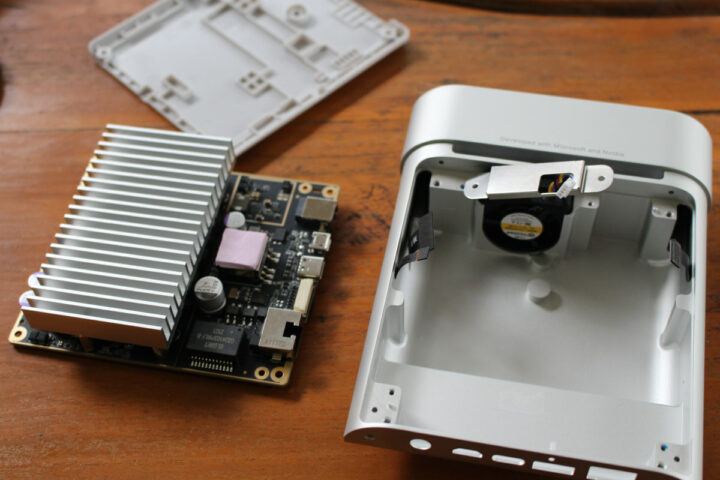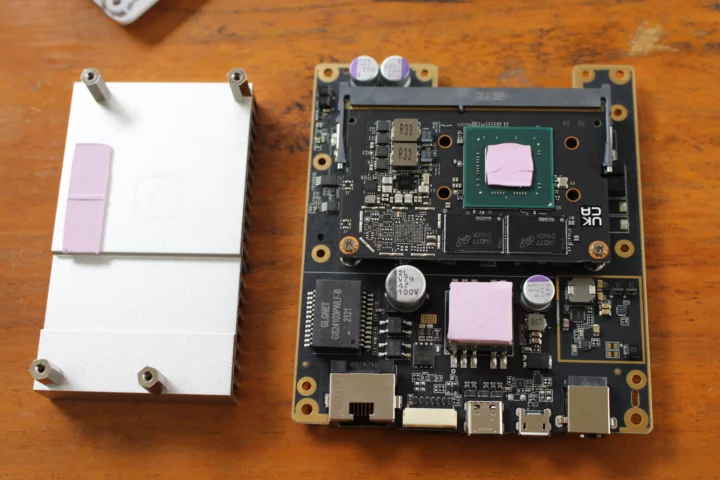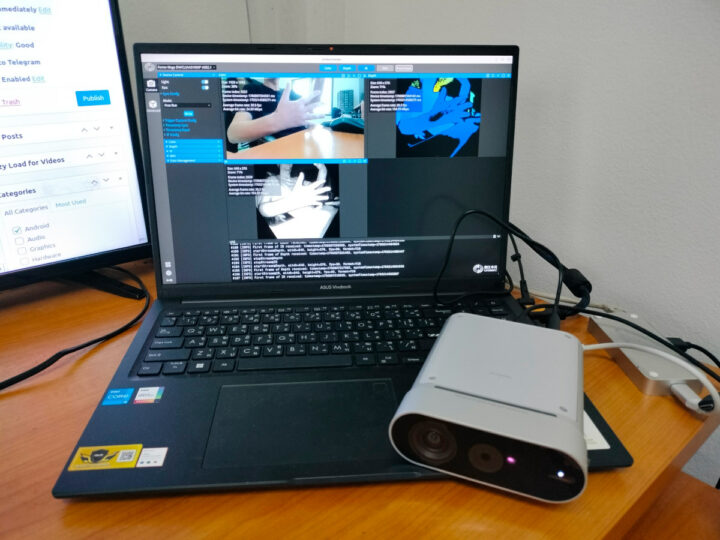Orbbec sent us a Femto Mega 4K RGB and 3D depth and camera for review. The camera is powered by an NVIDIA Jetson Nano module, features Microsoft ToF technology, and outputs RGB, TOF, and IR data through a USB-C port or a gigabit Ethernet port.
I’ll start the two-part with an unboxing, a teardown, and a quick try with the OrbbecViewer program on Ubuntu 22.04 in the first part of the review because checking out the software and SDK in more detail in the second part later on.
Femto Mega depth and RGB camera unboxing
I received the camera in a cardboard package showing the camera model and key features: “ORBBEC Femto Mega DEPTH+RGB CAMERA”.
The package’s content is comprised of a USB-C cable to connect to the host, the camera, and a 12V/2A power adapter.
The front side of the camera features the RGB camera sensor, the TOF (Time-of-Flight) sensor, the IR LED, and a status LED that lights up when the camera is active/recording.
Mounting threads can be found on the bottom and sides of the Femto Mega, so there are multiple ways the 3D depth camera can be mounted.
All ports can be found on the rear with a 12V DC jack, a micro USB port, a USB 3.0 for connection to a host, a Sync port when using multiple cameras at the same time, and an Ethernet port to control the camera over the network. There’s also a power LED that blinks orange if there’s not enough power (from the USB port) and is a solid white LED otherwise.
Femto Mega teardown
The top cover looks like it’s made to be opened so I loosen the four screws to take it out.
The only part useful to a typical user is the “BURN” button, but it’s also accessible by opening the camera through a pinhole that reads “Registration Pin”.
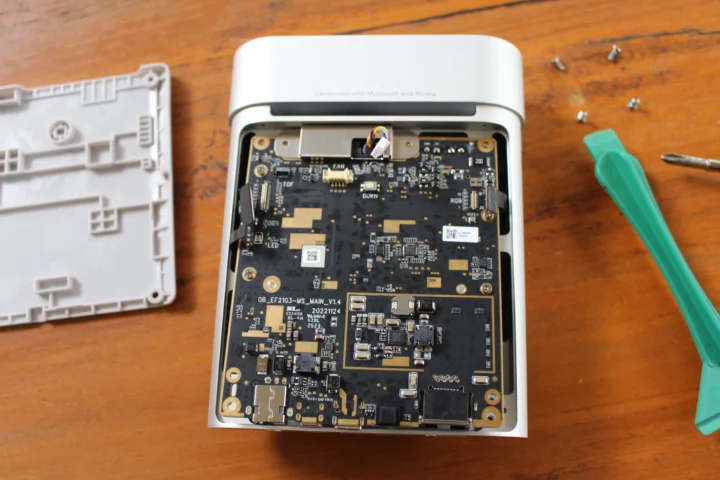 I’ve also taken the main board out. To do so I have to loosen several screws, unplugged the fan cable, and pulled up the flat cable for the RGB camera, TOF sensor, and (IR) LED. I’d recommend leaving the four screws in the middle as they hold the heatsink place on the Jetson Nano module as you can see below.
I’ve also taken the main board out. To do so I have to loosen several screws, unplugged the fan cable, and pulled up the flat cable for the RGB camera, TOF sensor, and (IR) LED. I’d recommend leaving the four screws in the middle as they hold the heatsink place on the Jetson Nano module as you can see below.
The heatsink is fairly thick, but a fan is apparently needed to cool the NVIDIA system-on-module. There’s another thick thermal pad that looks to be used to cool some chips for the USB PD circuitry, or am I getting this wrong? a POE transformer.
I also removed the heatsink and we can see two thermal pads to cool the Jetson Nano module’s processor and RAM chips.
Quick try with OrbbecViewer
I initially decided to try the Orbbec Femto Mega through its Ethernet port, but somehow, I did not seem to acquire any IP address… So I switched to USB and the camera shows as follows in my Ubuntu 22.04 laptop:
|
1 2 3 4 5 6 7 8 |
[ 3636.677517] usb 2-2: new SuperSpeed USB device number 5 using xhci_hcd [ 3636.698668] usb 2-2: New USB device found, idVendor=2bc5, idProduct=0669, bcdDevice= 0.02 [ 3636.698678] usb 2-2: New USB device strings: Mfr=1, Product=2, SerialNumber=3 [ 3636.698681] usb 2-2: Product: Orbbec Femto Mega 3D Camera [ 3636.698684] usb 2-2: Manufacturer: Orbbec [ 3636.698687] usb 2-2: SerialNumber: CL2AA31000P [ 3636.702001] usb 2-2: Found UVC 1.00 device Orbbec Femto Mega 3D Camera (2bc5:0669) [ 3636.704836] usb 2-2: Found UVC 1.00 device Orbbec Femto Mega 3D Camera (2bc5:0669) |
I also noticed some error messages in the kernel log, but they go away after a while:
|
1 2 3 4 5 6 7 |
... [ 3954.497720] usb 1-2.2: Failed to query (GET_CUR) UVC control 2 on unit 1: 0 (exp. 1). [ 3954.497887] usb 1-2.2: Failed to query (GET_DEF) UVC control 4 on unit 1: 0 (exp. 4). [ 3954.498043] usb 1-2.2: Failed to query (GET_MIN) UVC control 4 on unit 1: 0 (exp. 4). [ 3954.498219] usb 1-2.2: Failed to query (GET_MAX) UVC control 4 on unit 1: 0 (exp. 4). [ 3954.498375] usb 1-2.2: Failed to query (GET_RES) UVC control 4 on unit 1: 0 (exp. 4). ... |
If you are going to use a USB-C port with USB PD support, it will be possible to connect the camera with the provided USB-C cable for both data and power. But if you don’t have a spare USB-C port on your host device, you can connect it to a USB 3.2 port and the 12V/2A power adapter, since the USB Type-A port may not deliver enough power in which case the power LED will blink with orange color.
Since the Femto Mega camera is UVC compatible it can work with a program like guvcview, but Orbbec also provides their own viewer called OrbbecViewer with more options to view the three streams and configure the camera. It can be downloaded on the SDK page for Windows or Linux (x86 or Arm), so it might try it out on a Raspberry Pi 5 in the second part of the Orbbec Femto Mega review.
The photo shows the Femto Mega camera with OrbbecViewer showing the Color, Depth, and IR video streams from the camera.
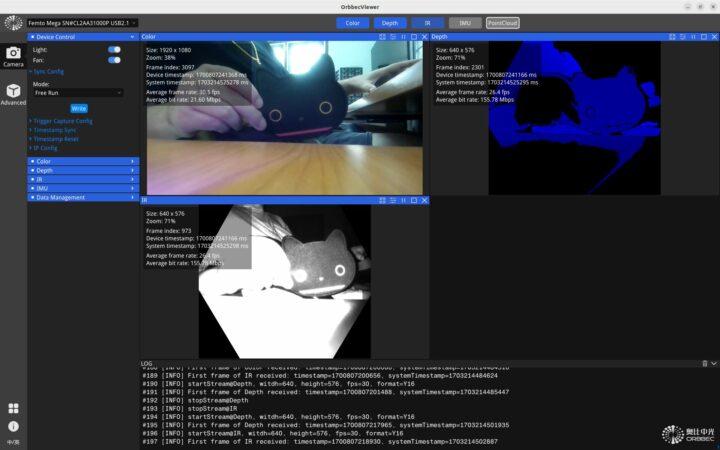
That will be all for today. I’ll have to do some more reading and learning before using additional features from the OrbbecViewer and the Orbbec SDK and reporting my experience with both in the second part of the review.
I’d like to thank Orbbec for sending the Orbbec Femto Mega RGB and depth camera for review, The camera can be purchased on Amazon for $909, but at this time it’s cheaper to purchase it on Orbbec’s own website for $649.99. We recently covered the Orbbec Persee N1 camera computer with similar features but a different form factor with a mini PC and attached camera that goes for $499.99. The price difference is likely because of the more compact form factor and the Femto Mega has a 4K RGB camera, while the Persee N1 features a Full HD RGB camera.
Continue reading: Femto Mega 3D depth camera review – OrbbecViewer and Orbbec SDK in Ubuntu 22.04, body tracking in Windows 11

Jean-Luc started CNX Software in 2010 as a part-time endeavor, before quitting his job as a software engineering manager, and starting to write daily news, and reviews full time later in 2011.
Support CNX Software! Donate via cryptocurrencies, become a Patron on Patreon, or purchase goods on Amazon or Aliexpress


